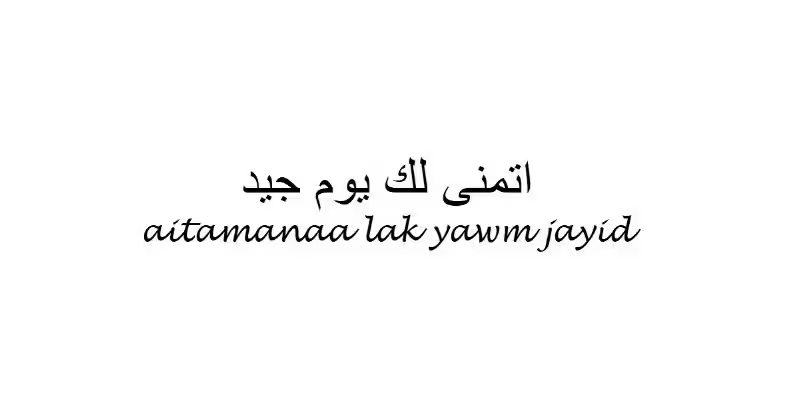
While a simple “Have a Good Day!” might suffice in English, the Arabic language offers a rich tapestry of expressions to convey this sentiment. Beyond the literal translation, these phrases reflect cultural nuances, levels of formality, and even personal wishes. Let’s explore the diverse ways to say “Have a Good Day!” in Arabic, unlocking a deeper understanding of this often-used phrase.
The Basics:
The most straightforward translation of “Have a Good Day!” in Arabic is “يوم سعيد” (Yawm Sa’eed). This phrase, meaning “Happy Day,” is universally understood and suitable for most situations. However, it’s like saying “Hello” in English – while correct, there’s always room for a more nuanced expression.
Formal Settings:
In professional or formal scenarios, a touch of respect and politeness is vital. You can express your wish for a good day with “أتمنى لكم يومًا سعيدًا” (Atamanna lakom yawman Sa’eedan), translating to “I wish you a good day.” This phrase conveys a genuine desire for the recipient to have a pleasant day. Similarly, “أرجو أن يكون يومك سعيدًا” (Arjū an yakūn yawmuka Sa’eedan), meaning “I hope your day is good,” offers another formal and polite option.
Example: Imagine you’re meeting a client for the first time. Instead of a simple “Have a good day,” you could use “أتمنى لكم يومًا سعيدًا” to express your professional courtesy.
Informal Settings:
When interacting with friends or family, a more casual and friendly approach is preferred. “بِسْـمِ اللهِ” (Bismillah), meaning “In the name of God”, is a common greeting that implies a wish for a good day, especially appropriate for those who are religious. Other informal options include:
- “يوم حلو” (Yawm ḥalū), meaning “Sweet day,” conveys a positive and friendly wish.
- “يوم جميل” (Yawm jamīl), meaning “Beautiful day,” is another way to express hope for a pleasant day.
- “بتوفيق” (Bitawfīq), meaning “With success,” is a good option if you want to wish someone well in their endeavors for the day.
Example: While meeting a friend for coffee, saying “يوم حلو لك” (“Sweet day for you”) would be a casual and friendly way to wish them well.
Adding Personal Touch:
Beyond the basic phrases, adding a personal touch can make your wish especially meaningful. For instance, you can say “أسعد الله يومك” (As’ad Allah yawmuka), meaning “May God make your day happy,” which expresses a heartfelt wish for a positive day.
Example: Instead of just saying “Have a good day,” you could say “أسعد الله يومك” to convey a genuine hope for their happiness.
Beyond the Words:
While choosing the right phrase is important, it’s equally crucial to convey your sincerity with your tone and demeanor. A genuine smile and friendly tone can go a long way in expressing warmth and good intentions.
Example: Even a simple “يوم سعيد” can be made more impactful with a friendly smile and warm tone.
Cultural Considerations:
Understanding the cultural context is key to using the right phrase. In many Arab cultures, it’s customary to greet people with “صباح الخير” (Sabah al-khayr), meaning “Good morning,” even in the afternoon. This highlights the importance of considering the cultural context when choosing the appropriate phrase.
Example: Even if it’s afternoon, saying “صباح الخير” to someone you encounter might be a more appropriate greeting than “Have a Good Day” in a particular Arab culture.
In Conclusion:
Saying “Have a Good Day!” in Arabic involves more than just a single phrase. It requires considering the context, level of formality, and cultural nuances. By utilizing the right expressions and conveying a genuine wish for a positive day, you can effectively communicate this sentiment in Arabic. So, the next time you want to wish someone well in Arabic, remember that there’s more to it than just a simple translation – it’s an opportunity to connect on a deeper level.
Frequently Asked Questions
How do you say “Have a good day” in Arabic?
The most common and direct translation of “Have a good day!” in Arabic is “يوم سعيد” (Yawm Sa’eed).
What are some other ways to say “Have a good day” in Arabic?
Depending on the context, other phrases might be more appropriate. For formal settings, you can opt for “أتمنى لكم يومًا سعيدًا” (Atamanna lakom yawman Sa’eedan) or “أرجو أن يكون يومك سعيدًا” (Arjū an yakūn yawmuka Sa’eedan). In informal settings, you can use “بِسْـمِ اللهِ” (Bismillah), “يوم حلو” (Yawm ḥalū), “يوم جميل” (Yawm jamīl), or “بتوفيق” (Bitawfīq).
How can I make my “Have a good day” wish more personal?
You can add a touch of warmth and sincerity by saying “أسعد الله يومك” (As’ad Allah yawmuka), meaning “May God make your day happy.”
What are some cultural considerations when saying “Have a good day” in Arabic?
In some Arab cultures, it’s customary to greet people with a phrase like “صباح الخير” (Sabah al-khayr), meaning “Good morning,” even if it’s the afternoon.
- The most common translation of “Have a Good Day!” in Arabic is “يوم سعيد” (Yawm Sa’eed).
- For formal settings, use “أتمنى لكم يومًا سعيدًا” (Atamanna lakom yawman Sa’eedan) or “أرجو أن يكون يومك سعيدًا” (Arjū an yakūn yawmuka Sa’eedan).
- Informal options include “بِسْـمِ اللهِ” (Bismillah), “يوم حلو” (Yawm ḥalū), “يوم جميل” (Yawm jamīl), and “بتوفيق” (Bitawfīq).
- Add a personal touch with “أسعد الله يومك” (As’ad Allah yawmuka), meaning “May God make your day happy”.
- A genuine smile and friendly tone enhance the message.
- Cultural context is vital, as “صباح الخير” (Sabah al-khayr) is a common greeting even in the afternoon.








